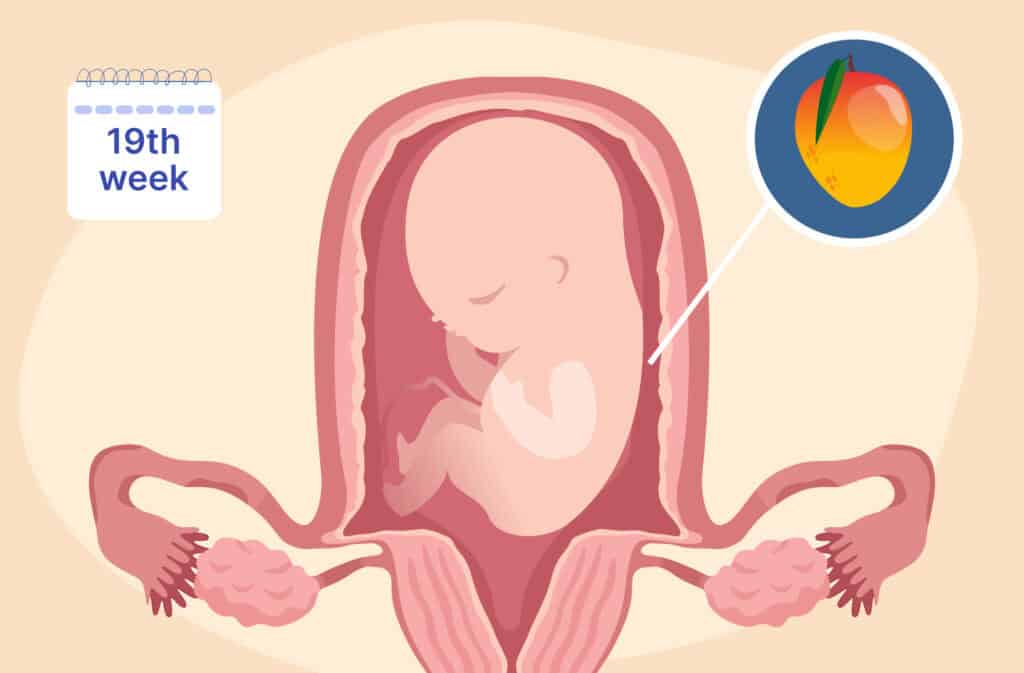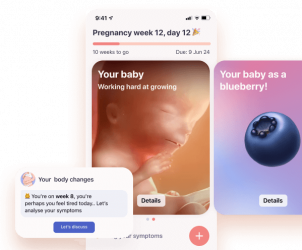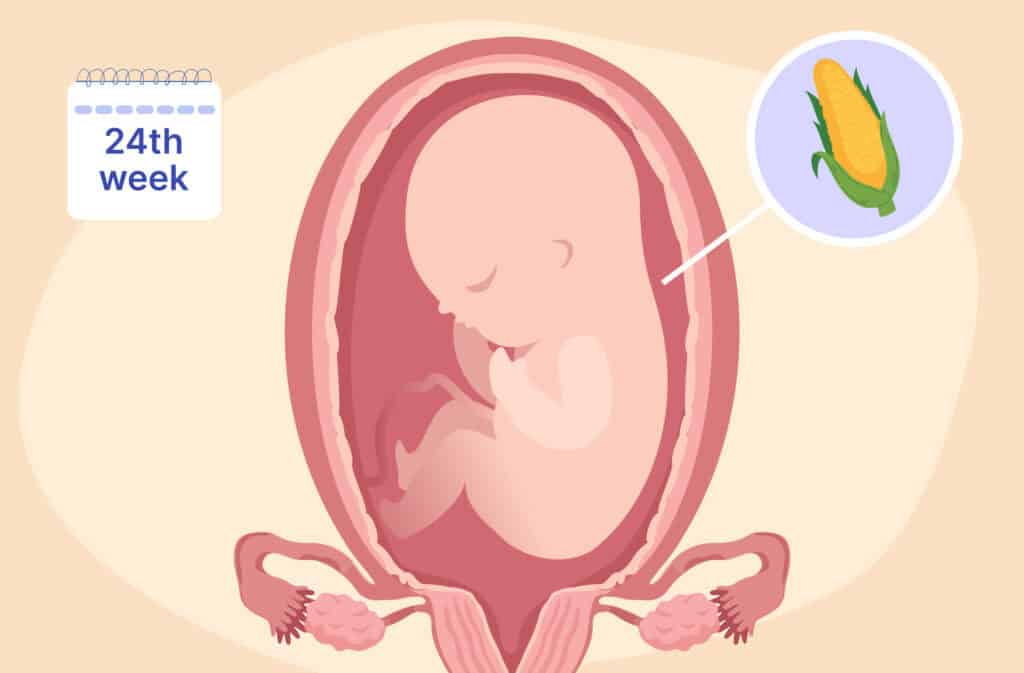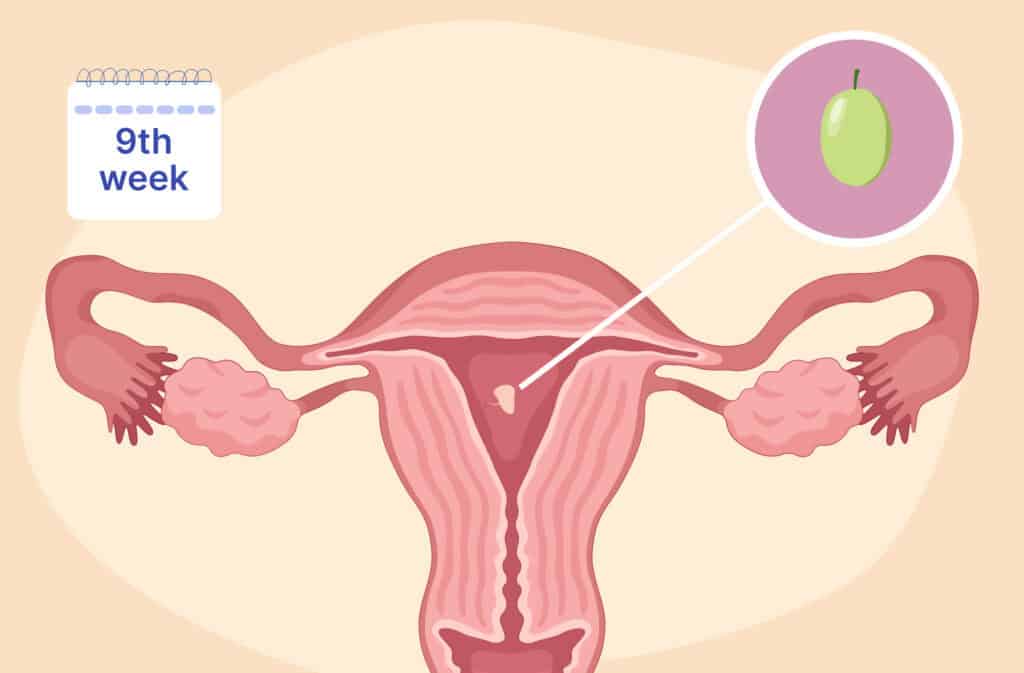Femia > Health Library > Pregnancy > Pregnancy week by week > Week 19 of pregnancy: What’s happening with your baby and bump
Week 19 of pregnancy: What’s happening with your baby and bump

- Updated Feb 27, 2025
- Published
CRAFTED BY HUMAN
Crafted by human At Femia, we provide accurate and up-to-date information at every stage of your journey, from trying to conceive, pregnancy and postnatal support. All content is created by a real person based on in-depth research and own professional experience. Femia ensures that you will receive expert advice, strict accuracy and a personalized approach from our authors/medical experts. Learn more about our editorial policy.
FACT CHECKED
Fact checked At Femia Health, we maintain the highest standards of editorial excellence in delivering content focused on helping you conceive, guiding you through pregnancy, and supporting you postpartum. Explore our content review principles to learn how we ensure the accuracy and quality of our health and lifestyle tips for every stage of your journey.
At 19 weeks pregnant, your baby is developing more refined movements and may start reacting to sounds. Now around the size of a mango, your baby’s muscles and bones are growing stronger. You may experience a rounder belly, increased appetite, and occasional difficulty concentrating.
At 19 weeks pregnant, you’re nearing the halfway point of your pregnancy, and exciting changes are happening with your baby’s development. For many moms-to-be, this is also the time when movements become more noticeable, allowing you to feel more connected to your little one. Your body is adapting as well, with a more prominent belly, new symptoms, and possibly increased energy levels. Here’s what to expect in week 19, from fetal development to self-care and symptom management.

Pregnant symptoms at 19 weeks
As you progress through week 19, new symptoms may arise, and existing ones may shift. Here are some common symptoms to expect at this stage:
Round ligament pain
As your uterus expands, the ligaments supporting it stretch and thicken, which may cause a sharp, stabbing pain known as round ligament pain. This discomfort can start in your groin and move toward the top of your hips. To relieve it, take a break, rest, and avoid movements that exacerbate the pain. It usually passes quickly.
Abdominal pain
Occasional abdominal cramps are normal during pregnancy, but if the cramping persists or becomes severe, it’s important to consult your healthcare provider. Especially if the pain is accompanied by other symptoms like fever, dizziness, or tenderness in the upper abdomen, which could indicate a more serious issue such as an infection.
Skin changes
Hormonal changes during pregnancy can cause various skin changes. You may notice a dark line running from your belly button to your pubic bone (linea nigra), as well as darkened areas on your face (melasma) and other parts of your body. These changes are temporary and usually fade after pregnancy, though they can cause some cosmetic concerns during this time.
Nosebleeds
Pregnancy increases blood flow, which can lead to more frequent nosebleeds due to the expansion of blood vessels in your nose. To manage a nosebleed, sit upright, pinch your nose, and lean forward to avoid swallowing blood. Applying cold to the nose can also help constrict blood vessels and stop the bleeding.
Shortness of breath
Feeling short of breath during pregnancy is common due to increased oxygen needs and pressure from your expanding uterus on the diaphragm. If you feel breathless, take it easy and rest. However, if the shortness of breath is sudden or severe, especially with other symptoms like rapid heartbeat, seek immediate medical attention.
👉Find out more: Exploring week 18: What’s happening with baby and your changing body
Your body at 19 weeks pregnant
At 19 weeks, your body is showing visible changes as your uterus grows. It’s now positioned just below your belly button, and you might begin to notice a rounder shape to your belly. As your pregnancy progresses, you may find that your center of gravity shifts, which can affect your balance and posture. Wearing supportive shoes and being mindful of your movements will help you stay steady.
Along with the growing belly, many women experience mild swelling in their feet and ankles. This is due to the increased blood volume and pressure from the expanding uterus. To alleviate this, remember to stay hydrated, elevate your feet when resting, and take breaks if you’re standing or sitting for long periods. These simple practices will help minimize discomfort and swelling as your body continues to adjust.
19-week pregnant belly
By 19 weeks, your belly is likely more defined, and you may be wearing maternity clothes to accommodate the growth. Each bump is unique, so don’t worry if you’re showing more or less than others at this stage—every pregnancy is different!
Baby development at 19 weeks
At 19 weeks, your baby is developing rapidly, with strengthened muscles, growing bones, and more controlled movements. As the baby moves more actively, you may notice regular flutters, especially after meals or in the evening.
- Fingerprints. Your baby’s skin is developing intricate patterns on their fingers and toes, creating distinct and permanent fingerprints and toeprints. These unique prints are formed early and are different even in identical twins.
- Development of the senses. At this stage, your baby’s sensory development is rapidly progressing. Their brain is actively designating areas for the senses of smell, taste, hearing, sight, and touch, laying the groundwork for these abilities after birth.
- Vernix caseosa. A protective white, waxy layer called vernix caseosa is beginning to coat your baby’s skin. This layer plays an important role by safeguarding and moisturizing the skin, protecting against infections, and aiding in the development of the lungs and digestive system.
19-week baby size
The 19-week fetus size is about 6 inches long and weighs approximately 8.5 ounces, comparable to the size of a mango. This is a period of growth, as your baby gains both weight and strength, becoming more active.
19-week ultrasound
A 19-week ultrasound often provides detailed images of your baby’s structure, movements, and even facial features. During a 19-week ultrasound 4D scan, you might catch sight of the baby moving, sucking their thumb, or even yawning. If you haven’t learned the baby’s gender yet, this scan may provide a clearer view.
Real-life 19-week fetus
A real-life 19-week fetus has more defined limbs, hands, and feet. The skin is still thin, but blood vessels are visible, and the body is becoming more proportionate. Movements are more frequent, giving your baby practice with reflexes and helping them grow stronger.

Tests to expect at 19 weeks of pregnancy
- Follow-up blood work: Your provider may order tests for anemia and iron levels as blood volume expands.
- Glucose screening prep: Your doctor may begin discussing the glucose tolerance test, which usually occurs between 24 and 28 weeks, to screen for gestational diabetes.
👉 Find out more:
Halfway there: Insights on being 20 weeks pregnant and fetal development
Health tips and self-care at 19 weeks pregnant
Staying hydrated
Staying hydrated is essential, especially as your body undergoes many changes to support your growing baby. Aim to drink plenty of water throughout the day to help manage swelling, improve digestion, and keep your energy levels up. Consider drinking water with meals, and always have a water bottle with you to stay hydrated on the go.
Managing swelling
Mild swelling in your feet and ankles is common during pregnancy, especially as the uterus grows. To reduce swelling, avoid standing or sitting for long periods of time, elevate your feet when possible, and wear comfortable shoes. Gentle exercises, like walking or swimming, can also help reduce swelling and improve circulation.
Supporting your back
As your baby grows and your center of gravity shifts, back pain is a common symptom. Use good posture to avoid straining your back, and consider wearing a pregnancy support belt for additional comfort. Light stretching, yoga, or swimming can help alleviate discomfort and strengthen your back muscles.
Taking care of your skin
Hormonal changes can lead to changes in your skin, including dryness and itching. Keep your skin hydrated with fragrance-free lotions or oils to soothe any itching, especially on your belly, breasts, and thighs. For a cooling effect, try using a refrigerated lotion or gel.
Light exercise
Incorporating light exercises like walking, yoga, or swimming into your routine can improve your circulation, alleviate muscle aches, and boost your energy levels. Be sure to listen to your body and avoid overexertion—aim for 30 minutes of moderate activity most days of the week, and consult your provider before beginning any new exercise program.
Avoiding overheating
As your body temperature rises during pregnancy, it’s important to avoid overheating. Try to stay cool by dressing in loose, breathable clothing and taking breaks in cool environments. Avoid hot tubs or saunas, and drink plenty of water to help regulate your body temperature.
Questions from the Femia community
Can I use sex toys during pregnancy?
Yes, sex toys are generally safe during pregnancy as long as they are clean and used gently. Avoid anything that causes discomfort or could potentially introduce infection.
I have trouble concentrating. How can I deal with it?
“Pregnancy brain” is common due to hormonal changes. Keeping a notepad for reminders, practicing mindfulness, and getting enough rest can help improve focus.
How to deal with cellulite during pregnancy?
Staying hydrated, engaging in regular light exercise, and eating a balanced diet can help manage cellulite. Embracing these changes as part of pregnancy is key, as many skin changes resolve post-pregnancy.
Are swollen feet normal at this stage?
Mild swelling is common, especially later in the day. Staying hydrated, elevating your feet, and avoiding long periods of standing can help relieve swelling. If you notice one leg/calf is significantly more swollen than the other, contact your healthcare provider for an evaluation.
The bottom line
At 19 weeks pregnant, your baby is growing rapidly, developing stronger muscles, and becoming more responsive to sounds. Your belly is more pronounced, and you may notice an increased appetite and other new symptoms. It’s helpful to track pregnancy symptoms in an app to manage your increased appetite and occasional difficulty concentrating while enjoying the changes in your growing belly. Focusing on hydration, balanced nutrition, and comfortable footwear will support your body as it adapts to these exciting changes.
References
- “19 Weeks Pregnant: Symptoms, Baby Development & Tips.” BabyCenter, www.babycenter.com/pregnancy/week-by-week/19-weeks-pregnant.
- “Week 19 of Pregnancy: Symptoms, Baby Development & More.” What to Expect, www.whattoexpect.com/pregnancy/week-by-week/week-19.aspx.
- “19 Weeks Pregnant: Baby Development, Symptoms & Tips.” NHS, www.nhs.uk/pregnancy/week-by-week/1-to-12/19-weeks/.
- “Pregnancy Week 19: What to Expect.” American Pregnancy Association, www.americanpregnancy.org/healthy-pregnancy/week-by-week/19-weeks-pregnant/.

At 24 weeks pregnant, your baby is growing fast and developing key features. Learn about fetal size, symptoms, and self-care tips for week 24.

At 9 weeks pregnant, your baby is now moving and growing fast! Find out about symptoms, baby size, and how to care for yourself this week.

Experiencing postpartum dizziness or vertigo? Learn about 7 common causes, how long it lasts, and treatment options. Discover when to seek help for lightheadedness after pregnancy.

